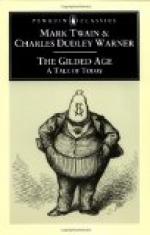CHAPTER XXVIII.
Whatever may have been the language of Harry’s letter to the Colonel, the information it conveyed was condensed or expanded, one or the other, from the following episode of his visit to New York:
He called, with official importance in his mien, at No.— Wall street, where a great gilt sign betokened the presence of the head-quarters of the “Columbus River Slack-Water Navigation Company.” He entered and gave a dressy porter his card, and was requested to wait a moment in a sort of ante-room. The porter returned in a minute; and asked whom he would like to see?
“The president of the company, of course.”
“He is busy with some gentlemen, sir; says he will be done with them directly.”
That a copper-plate card with “Engineer-in-Chief” on it should be received with such tranquility as this, annoyed Mr. Brierly not a little. But he had to submit. Indeed his annoyance had time to augment a good deal; for he was allowed to cool his heels a frill half hour in the ante-room before those gentlemen emerged and he was ushered into the presence. He found a stately dignitary occupying a very official chair behind a long green morocco-covered table, in a room with sumptuously carpeted and furnished, and well garnished with pictures.
“Good morning, sir; take a seat—take a seat.”
“Thank you sir,” said Harry, throwing as much chill into his manner as his ruffled dignity prompted.
“We perceive by your reports and the reports of the Chief Superintendent, that you have been making gratifying progress with the work.—We are all very much pleased.”
“Indeed? We did not discover it from your letters—which we have not received; nor by the treatment our drafts have met with—which were not honored; nor by the reception of any part of the appropriation, no part of it having come to hand.”
“Why, my dear Mr. Brierly, there must be some mistake, I am sure we wrote you and also Mr. Sellers, recently—when my clerk comes he will show copies—letters informing you of the ten per cent. assessment.”
“Oh, certainly, we got those letters. But what we wanted was money to carry on the work—money to pay the men.”
“Certainly, certainly—true enough—but we credited you both for a large part of your assessments—I am sure that was in our letters.”
“Of course that was in—I remember that.”
“Ah, very well then. Now we begin to understand each other.”
“Well, I don’t see that we do. There’s two months’ wages due the men, and——”
“How? Haven’t you paid the men?”
“Paid them! How are we going to pay them when you don’t honor our drafts?”
“Why, my dear sir, I cannot see how you can find any fault with us. I am sure we have acted in a perfectly straight forward business way.—Now let us look at the thing a moment. You subscribed for 100 shares of the capital stock, at $1,000 a share, I believe?”




